| |||||||||||||||||
| |||||||||||||||||
| |||||||||||||||||
| Elections in Indiana |
|---|
 |
The 1952 United States Senate election in Indiana took place on November 4, 1952. Incumbent Republican U.S. Senator William E. Jenner was for re-elected to a second term in office over Governor of Indiana Henry F. Schricker.
| |||||||||||||||||
| |||||||||||||||||
| |||||||||||||||||
| Elections in Indiana |
|---|
 |
The 1952 United States Senate election in Indiana took place on November 4, 1952. Incumbent Republican U.S. Senator William E. Jenner was for re-elected to a second term in office over Governor of Indiana Henry F. Schricker.
| Party | Candidate | Votes | % | ±% | |
|---|---|---|---|---|---|
| Republican | William E. Jenner (incumbent) | 1,020,605 | 52.44% | ||
| Democratic | Henry F. Schricker | 911,169 | 46.82% | ||
| Prohibition | Carl W. Thompson | 12,734 | 0.65% | ||
| Progressive | Carl Leon Eddy | 891 | 0.05% | N/A | |
| Socialist Labor | John Marion Morris | 719 | 0.04% | ||
| Total votes | 1,946,118 | 100.00% | |||
| Republican hold | |||||

William Ezra Jenner was an American lawyer and politician from the state of Indiana. A Republican, Jenner was an Indiana state senator from 1934 to 1942, and a U.S. senator from 1944 to 1945 and again from 1947 to 1959. In the Senate, Jenner was a supporter of McCarthyism.

The 1964 United States Senate elections coincided with the election of President Lyndon B. Johnson by an overwhelming majority, to a full term. His Democratic Party picked up a net two seats from the Republicans. As of 2022, this was the last time either party has had a two-thirds majority in the Senate, which would have hypothetically allowed the Senate Democrats to override a veto, propose constitutional amendments, convict and expel certain officials, or invoke cloture without any votes from Senate Republicans. In practice, however, internal divisions effectively prevented the Democrats from doing so. The Senate election coincided with Democratic gains in the House in the same year.

The 1962 United States Senate elections was an election for the United States Senate which was held in the middle of President John F. Kennedy's term. His Democratic Party made a net gain of four seats from the Republicans, increasing their control of the Senate to 68-32. However, this was reduced to 67-33 between the election and the next Congress, as on November 18, 1962, Democrat Dennis Chávez, who was not up for election that year, died. He was replaced on November 30, 1962, by Republican appointee Edwin L. Mechem. This was the first time since 1932 that Democrats gained seats in this class of Senators.

The 1960 United States Senate elections coincided with the election of John F. Kennedy as president on November 8, 1960. A special election was held on June 28, 1960, for a mid-term vacancy in North Dakota. The Republicans gained two seats at the expense of the Democrats. However, Republican Senator-elect Edwin Keith Thomson of Wyoming died December 9, 1960, and was replaced by appointee Democratic John J. Hickey at the beginning of the Congress, reducing Republican gains to one seat.
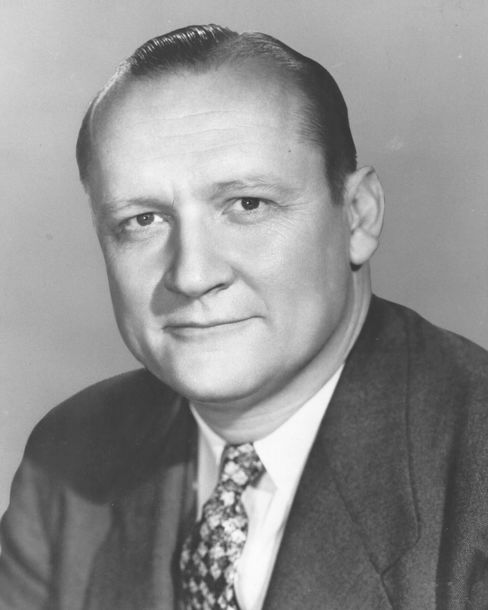
The 1958 United States Senate elections were elections for the United States Senate which occurred in the middle of President Dwight D. Eisenhower's second term.

The 1954 United States Senate elections was a midterm election in the first term of Dwight D. Eisenhower's presidency. Eisenhower's Republican party lost a net of two seats to the Democratic opposition. This small change was just enough to give Democrats control of the chamber with the support of an Independent who caucused with them.

The 1944 United States Senate elections coincided with the re-election of Franklin D. Roosevelt to his fourth term as president. The Democrats retained their large majority, although they lost a net of one seat to the Republicans.

The 1926 United States Senate elections were elections for the United States Senate that occurred in the middle of Republican President Calvin Coolidge's second term. The Republican majority was reduced by seven seats.
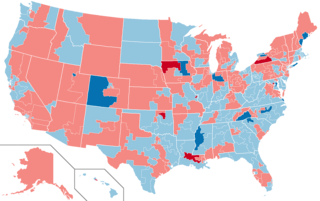
The 1986 United States House of Representatives elections was held on November 4, 1986, in the middle of President Ronald Reagan's second term in office, while he was still relatively popular with the American public. As in most mid-term elections, the President's party — in this case, the Republican Party — lost seats, with the Democratic Party gaining a net of five seats and cementing its majority. These results were not as dramatic as those in the Senate, where the Republicans lost control of the chamber to the Democrats.

Henry Frederick Schricker was an American politician who served as the 36th and 38th Governor of the U.S. state of Indiana from 1941 to 1945 and from 1949 to 1953. He is the only Indiana governor elected to two non-consecutive terms, and the only governor between 1852 and 1977 to be elected to more than one term in office. His terms were marked by strong opposition party control of the Indiana General Assembly, which attempted to remove powers from the governor that had been granted during the Great Depression. Schricker fought the attempt in the state courts, and although his power was significantly reduced, the Indiana Supreme Court ruled in the case of Tucker v. Indiana that the governor was the chief executive of the state, and the legislature could not pass legislation that interfered with the division of powers.
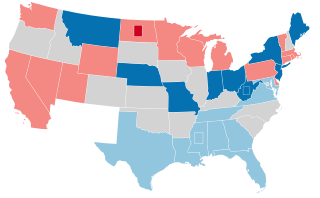
The 1910–11 United States Senate election, although the 17th Amendment was not passed until 1913, some states elected their senators directly before its passage. Oregon pioneered direct election and experimented with different measures over several years until it succeeded in 1907. Soon after, Nebraska followed suit and laid the foundation for other states to adopt measures reflecting the people's will. By 1912, as many as 29 states elected senators either as nominees of their party's primary or in conjunction with a general election.

Frederick Van Nuys was a United States senator from Indiana. Born in Falmouth, he attended the public schools and graduated from Earlham College in 1898 and from Indiana Law School in 1900. He was admitted to the bar in 1900 and commenced practice in Shelbyville moving shortly afterward to Anderson. From 1906 to 1910 he was prosecuting attorney of Madison County and was a member of the Indiana Senate from 1913 to 1916, serving as president pro tempore in 1915. He moved to Indianapolis in 1916 and continued the practice of law; he was United States Attorney for the U.S. District of Indiana from 1920 to 1922.

The 1994 United States Senate election in Michigan was held November 8, 1994. Incumbent Democratic U.S. Senator Don Riegle decided to retire and not run for re-election. Republican Spencer Abraham won the open seat, becoming the first Republican to win a U.S. Senate race in Michigan since 1972 and the first Republican gain of the Class I Senate seat from Charles E. Potter since 1952. As of 2022, this was the last time the Republicans won a U.S. Senate election in Michigan.

The 1822–23 United States Senate elections were elections for the United States Senate that had the Democratic-Republican Party continue almost complete control of the Senate.
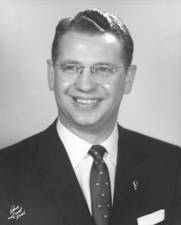
The 1958 United States Senate election in Indiana was held on November 4, 1958. Outgoing Senator William E. Jenner, a Republican, retired and was succeeded by Democrat Vance Hartke, the mayor of Evansville, Indiana.

The United States Senate election in Washington of 1952 was held on November 4, 1952. Incumbent and highly-controversial Republican Harry Cain ran for a second term in office, but was defeated by Democratic U.S. Representative Henry M. Jackson. Jackson served 30 years as a United States Senator.

The 1946 United States Senate election in Indiana took place on November 5, 1946. Incumbent Republican U.S. Senator Raymond E. Willis did not run for re-election. Former interim Senator William E. Jenner was elected over Governor of Indiana M. Clifford Townsend.
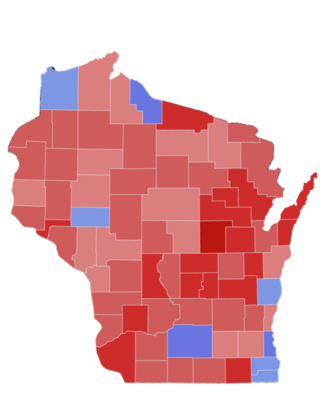
The 1952 United States Senate election in Wisconsin was held on November 4, 1952.

The 1944 United States Senate elections in Indiana took place on November 7, 1944.